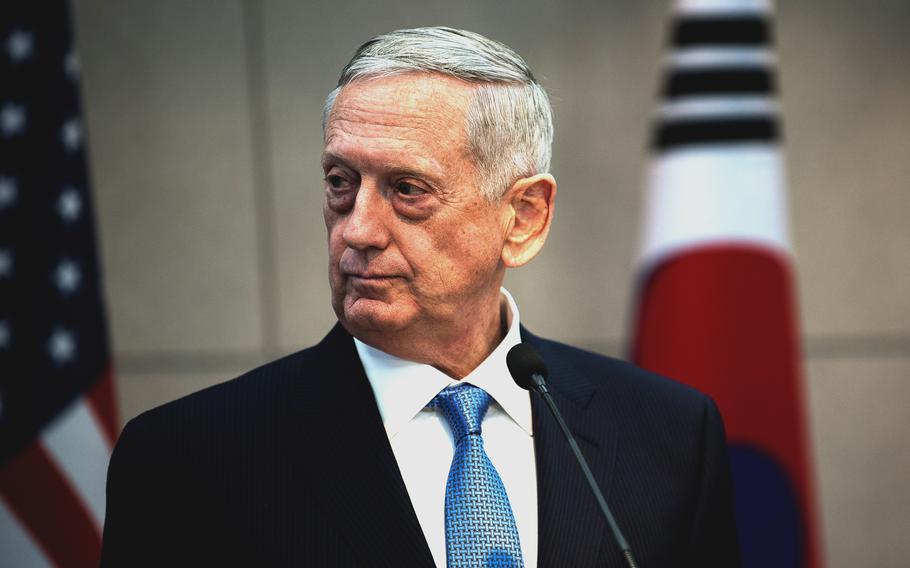
Jim Mattis, at the time the U.S. Defense Secretary, is pictured at a news conference at the Ministry of National Defense in Seoul, South Korea, on Feb. 2, 2017. (Amber I. Smith/U.S. Army)
SEOUL, South Korea — Donald Trump’s unconventional summits with North Korean leader Kim Jong Un in 2018 and 2019 produced nothing, former Defense Secretary Jim Mattis said at a forum here Friday.
The United States under Trump’s presidency was “not traditional for what America’s role has been in the world,” the retired Marine general and former head of Central Command said at a gathering hosted by the Seoul Forum for International Affairs, the Center for Strategic and International Studies and the Korea Society in Seoul.
The two nations were threatening war in 2017, but Kim and Trump emerged friends from their 2018 summit in Singapore, trading “love letters” afterwards. The two met again the following year in Hanoi, Vietnam, and at the Demilitarized Zone that separates North and South Korea.
Trump hailed the meetings as momentous developments, but foreign policy experts widely criticized them for failing to produce any agreements between the two countries.
“As far as what came out of it, I would say nothing,” Mattis said of the summits. “I saw nothing that came out of it.”
In 2020, North Korea resumed missile tests and its bellicose statements aimed at the U.S. and South Korea. North Korea has so far this year launched 17 rounds of missile tests, a one-year record.
“President Trump was an unusual leader” who believed in “personal diplomacy,” Mattis said.
“He was convinced that he could work something out with Kim — I was not optimistic,” he added. “My job was to make certain I did everything I could to stand by the [South Korean] Ministry of Defense and make certain the U.S. military … ties were absolutely at the top of their game to ensure that we were buying the time to safely engage in that summit.”
In contrast to Trump’s record, Mattis said, President Joe Biden met with South Korean President Yoon Seok Youl a record 10 days after Yoon’s inauguration in May. “Under President Biden, we have seen the earliest summit meeting between Korea … which shows the priority that the Americans place on the relationship,” Mattis said.
Trump’s presidency was a “very strange time in America,” Mattis said.
“Democracies go through raucous times,” he said. “Democracies will at times go populist and they will at times break the tradition. It’s the nature of democracies at times to be testing ideas.”
The first of Trump’s three defense secretaries, Mattis resigned from the Cabinet in 2018, citing his disagreement with the abrupt withdrawal of U.S. forces from Syria.
Two years later, Mattis, quoted in The Atlantic magazine, said Trump “is the first president in my lifetime who does not try to unite the American people — does not even pretend to try.”
Deterring aggression in the Indo-Pacific requires a group effort, and the U.S.-South Korea is key to that effort, Mattis told his audience.
“I think that the Korea-American alliance is actually a model for others,” Mattis said. “Why? Because in the face of an adversary right next door, within artillery range of where we sit right now, it is the alliance that has helped maintain the peace.”